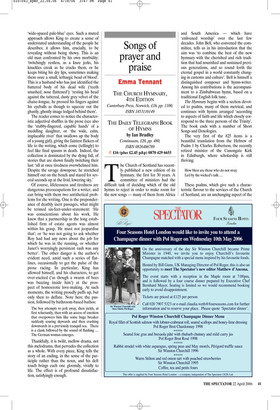Swansong at twilight
Stephen Abell
THE SUNLIGHT ON THE GARDEN by Francis King Arcadia, £11.99, pp. 192, ISBN 1900850990 ✆ £9.59 (plus £2.45 p&p) 0870 429 6655 It is, if you stop to think about it, an important literary question: what, exactly, is the point of short stories? They so often can — to this reader at least — be dismissed merely as stunted or early-aborted novels, a single idea gestated in the writer’s imagination that has inescapably failed to divide, multiply and develop into a full-grown body of work. They feel incomplete, inconsequential, unsatisfying. Fortunately, Francis King has shown us a (perhaps the) redeeming feature. He has realised that a short story is the perfect form to tell of shortened existence, of life not being allowed fully to develop or finally being brought to an end. His writing is dissatisfied, but not unsatisfying.
Certainly, this collection is tinged and tainted by grief throughout, like an old album of sepia-stained photographs. Every story contains the presence of death, from the first, ‘Mouse’, in which an old man recalls the premature loss in wartime of his boyhood prefect and love (‘his body shuddered against mine. Then he began to sob, in what sounded like a prolonged, useless bout of retching’) to ‘Causes’, the final tale of a man’s trip to Egypt to pick up the belongings of his dead twin, which leaves him contemplating ‘the dying light of a sun that seems to rest, an enormous, immoveable disk above the sterile, humped mountains’.
Sunlight in The Sunlight on the Garden is predominantly like this: a fading, mournful twilight in which the colour has been catheterised from the world. King is keen to emphasise this contagious colourlessness, which comes to infect the very vision of his characters with their ‘watery, washed-out blue’, ‘bleak, extraordinarily pale blue’, or ‘wide-spaced pale-blue’ eyes. Such a muted approach allows King to create a sense of understated understanding of the people he describes; it allows him, crucially, to be revealing without being showy. This is an old man confronted by his own morbidity: ‘twitchingly restless, as a knee jerks, his knuckles creak as he cracks them, or he keeps biting his dry lips, sometimes making them ooze a small, lethargic bead of blood’. This is a husband who has just identified the battered body of his dead wife (‘teeth smashed, nose flattened’): ‘resting his head against the tattered, dusty grey velvet of the chaise-longue, he pressed his fingers against his eyeballs as though to squeeze out the ghastly, ghostly image lodged behind them’.
The reader comes to notice the characteristic adjectival shuffles in the prose (see also the ‘stubby-fingered, capable hands’ of a meddling daughter, or ‘the wide, calm, implacable river’ that swallows up the body of a young girl), giving the faintest flickers of life to the writing, which come (tellingly) to feel like final spasms in death. Indeed, the collection is dominated by the dying fall, of stories that are shown finally twitching their last: ‘all at once tiredness overwhelmed him. Despite the savage downpour, he stretched himself out on the bench and stared for several seconds up at the livid, lowering sky.’ Of course, lifelessness and tiredness are dangerous preoccupations for a writer, and can bring with them two antithetical problems for the writing. One is the preponderance of deathly inert passages, what might be termed six-feet-under-statement: ‘He was conscientious about his work. He knew that a partnership in the long established firm of estate agents was almost within his grasp. He must not jeopardise that’; or ‘he was not going to ask whether Roy had had any news about the job for which he was in the running, or whether Janet’s worryingly persistent rash was any better’. The other danger is the author’s evident need, amid such a series of flatlines, occasionally to get the pulse of the prose racing. In particular, King has allowed himself, and his characters, to get over-excited (‘as though a swarm of bees was buzzing inside him’) at the prospect of homoerotic love-making. At such moments, the writing proudly puffs up, but only then to deflate. Note here the passion, followed by bathroom-based bathos:
The boy attempts to jerk away, then yields, at first reluctantly, then with an access of emotion that overpowers him like some huge breaker suddenly soaring skywards and then crashing downwards in a previously tranquil sea. There is a clank followed by the sound of flushing ... The German woman emerges.
Thankfully, it is twilit, mellow drama, not this melodrama, that pervades the collection as a whole. With every piece, King tells the story of an ending, in the sense of the participle rather than the noun, and his deft touch brings each one gloomily, vividly to life. The effect is of profound dissatisfaction, satisfyingly enough.



































































 Previous page
Previous page